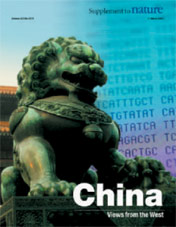This collection of articles is unprecedented: a Nature
supplement that was written for researchers in China and originally
published, at the end of last year, in the Chinese language.
The primary motivation for this supplement is our recognition
of several positive trends. China is developing fast as a
major economic force in the Asian Pacific and in the world
at large. This is partly thanks to the natural entrepreneurship
of the Chinese people, but also due to their dedicated pursuit
of new technologies. Equally important, China has over many
years sustained its efforts to turn itself into a world-class
scientific power. Noone who visits China can fail to be impressed
with the results.
But there is a worrying aspect to these trends. Despite such
continuous development, and despite major expenditure on science
by the Chinese government, China is not yet fulfilling its
scientific potential, for reasons that are discussed in these
pages. This results not only in a low scientific profile on
the world stage, but also in lost opportunities to make the
most of what the rest of the world can offer, both scientifically
and technologically. This also leads to missed opportunities
for China to improve its economy and the quality of life for
its citizens.
This supplement is a small but, we hope, significant attempt
to rectify this major anomaly in international research. Authors
from diverse fields here provide constructive advice and proposals
for Chinese scientific and technological development. It is
appropriate that they are senior researchers embedded in Western
scientific culture. But it was also essential that they have
an intimate familiarity with China's research landscape and
its opportunities.
In this collection there are forward-looking contributions
covering several disciplines, from biomedical research to
agriculture. There is also advice that is relevant to all
disciplines, about the characteristics required if a culture
and system is to become universally recognized as scientifically
world-class. Two common themes in these articles are the need
for greater engagement by China with researchers in other
countries, and the need to take measures that will encourage
the very best of Chinese researchers in the West to return
to their homeland.
I believe that the distinguished contributors to this supplement,
all of them of Chinese descent, successfully bridge Chinese
and Western cultures in a fashion that can stimulate scientists
and policy-makers in China.
Above all, I must thank the authors themselves, who avidly
seized this opportunity to provide their views about a country
whose scientific future they demonstrably care about so much.
